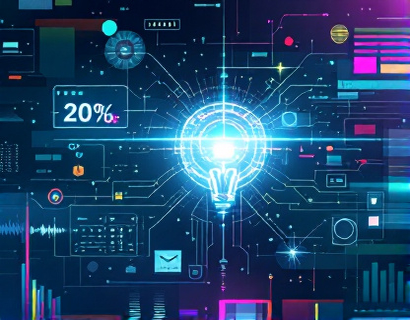Revolutionizing Digital Experiences: The Synergy of Crypto and AI
The intersection of cryptocurrency and artificial intelligence (AI) is ushering in a new era of digital transformation, one that promises to redefine how we interact with technology and each other. This convergence is not just a technological curiosity but a powerful force that is reshaping industries and creating unprecedented opportunities for tech pioneers and early adopters. As we delve into this topic, it's essential to understand the fundamental components of both crypto and AI, and how their integration is driving innovation.
Understanding Cryptocurrency
Cryptocurrency, often referred to as digital or virtual currency, uses cryptography for security and operates on a decentralized network known as a blockchain. This technology ensures transparency, immutability, and security, making it an attractive alternative to traditional financial systems. Bitcoin, launched in 2009, was the first and most well-known cryptocurrency, but since then, thousands of other coins and tokens have emerged, each with unique features and use cases. Beyond mere currency, cryptocurrencies are becoming a medium for decentralized applications (dApps), smart contracts, and even a form of digital identity.
Exploring Artificial Intelligence
Artificial intelligence, on the other hand, encompasses a broad range of technologies designed to simulate human intelligence in machines. These include machine learning, natural language processing, computer vision, and robotics. AI systems can learn from data, adapt to new inputs, and perform tasks that traditionally required human intervention. The advancements in AI have been rapid, driven by increased computational power, larger datasets, and more sophisticated algorithms. From autonomous vehicles to personalized recommendations, AI is already transforming various sectors, including healthcare, finance, and entertainment.
The Synergy of Crypto and AI
The combination of cryptocurrency and AI is particularly potent because it leverages the strengths of both technologies. Crypto provides a secure, decentralized infrastructure, while AI enhances the functionality and efficiency of blockchain-based systems. This synergy is leading to the development of smart, autonomous, and secure digital ecosystems. For tech innovators and early adopters, understanding this synergy is crucial for staying ahead in a rapidly evolving technological landscape.
Enhanced Security through AI
One of the most significant benefits of integrating AI with cryptocurrency is enhanced security. AI algorithms can detect and respond to threats in real-time, identifying patterns that might indicate fraudulent activity or network vulnerabilities. For instance, machine learning models can analyze transaction data to spot anomalies, reducing the risk of cyberattacks and ensuring the integrity of the blockchain. This is particularly important as the value of cryptocurrencies continues to rise, making them more attractive targets for malicious actors.
Optimized Smart Contracts
Smart contracts, self-executing contracts with the terms directly written into code, can be significantly improved with AI. AI can optimize the execution of smart contracts by predicting outcomes, automating complex decision-making processes, and ensuring compliance with predefined rules. For example, AI can help in dynamically adjusting the terms of a smart contract based on real-time data, making the contracts more flexible and efficient. This not only reduces the need for intermediaries but also enhances the reliability and speed of transactions.
Decentralized AI Platforms
Decentralized AI platforms are another exciting area where crypto and AI intersect. These platforms allow AI models to be trained and deployed on a decentralized network, leveraging the computational power of multiple nodes. This approach not only democratizes access to AI technology but also ensures that data remains private and secure. Users can contribute their computational resources and data to the network, earning cryptocurrency rewards in return. This model incentivizes participation and fosters a collaborative environment for AI development.
Tokenized Data Marketplaces
Tokenized data marketplaces are revolutionizing how data is bought, sold, and shared. In these platforms, data is represented as tokens on a blockchain, allowing for secure and transparent transactions. AI plays a crucial role in these marketplaces by valuing data based on its quality, relevance, and demand. This ensures that data providers are fairly compensated, while data consumers can access high-quality data for training and improving AI models. The use of smart contracts in these marketplaces automates the process, reducing friction and increasing efficiency.
Personalized User Experiences
The integration of AI with cryptocurrency also enhances user experiences through personalization. AI algorithms can analyze user behavior and preferences to provide tailored recommendations and services. In the context of crypto, this means that users can enjoy a more customized and intuitive experience when interacting with blockchain-based applications. For example, a decentralized finance (DeFi) platform can use AI to suggest investment strategies based on a user's risk profile and market conditions, all while ensuring that transactions are secure and transparent.
Supply Chain Transparency
Supply chain management is another sector that benefits greatly from the combination of crypto and AI. Blockchain technology provides a transparent and immutable record of transactions, while AI can optimize and monitor the supply chain in real-time. AI algorithms can predict demand, optimize inventory levels, and detect potential bottlenecks, ensuring a smoother and more efficient supply chain. When combined with cryptocurrency, these processes can be executed without the need for intermediaries, reducing costs and increasing trust among all parties involved.
Challenges and Considerations
While the potential of merging crypto and AI is vast, there are several challenges and considerations that tech innovators and early adopters must be aware of. Regulatory uncertainty remains a significant hurdle, as governments around the world are still grappling with how to regulate these emerging technologies. Ensuring compliance with existing laws while advocating for supportive regulatory frameworks is crucial. Additionally, the technical complexity of integrating AI with blockchain requires a skilled workforce and significant investment in research and development.
Ethical Considerations
Ethical considerations are also paramount. The use of AI in crypto must be guided by principles of fairness, transparency, and accountability. There is a risk of bias in AI algorithms, which can lead to unfair outcomes, especially in financial applications. Ensuring that AI systems are designed and trained with diverse datasets is essential to mitigate these risks. Moreover, the environmental impact of both crypto and AI, particularly the energy consumption of blockchain networks, needs to be addressed to promote sustainable technology practices.
Future Outlook
Looking ahead, the convergence of crypto and AI is poised to drive further innovation and transformation. As technology advances, we can expect more sophisticated AI models that can handle the complexity of blockchain networks more efficiently. The development of quantum-resistant algorithms and the adoption of more energy-efficient consensus mechanisms will be key areas of focus. Additionally, the integration of AI with other emerging technologies, such as the Internet of Things (IoT) and 5G, will create even more powerful and interconnected digital ecosystems.
Conclusion
The synergy between cryptocurrency and AI represents a paradigm shift in the digital landscape, offering unprecedented opportunities for tech pioneers and early adopters. By enhancing security, optimizing smart contracts, creating decentralized AI platforms, and personalizing user experiences, this combination is reshaping the way we interact with technology. While challenges and ethical considerations must be addressed, the potential benefits are immense. For those at the forefront of this revolution, embracing the intersection of crypto and AI is not just a strategic advantage but a necessity for staying relevant in the future of technology.










































